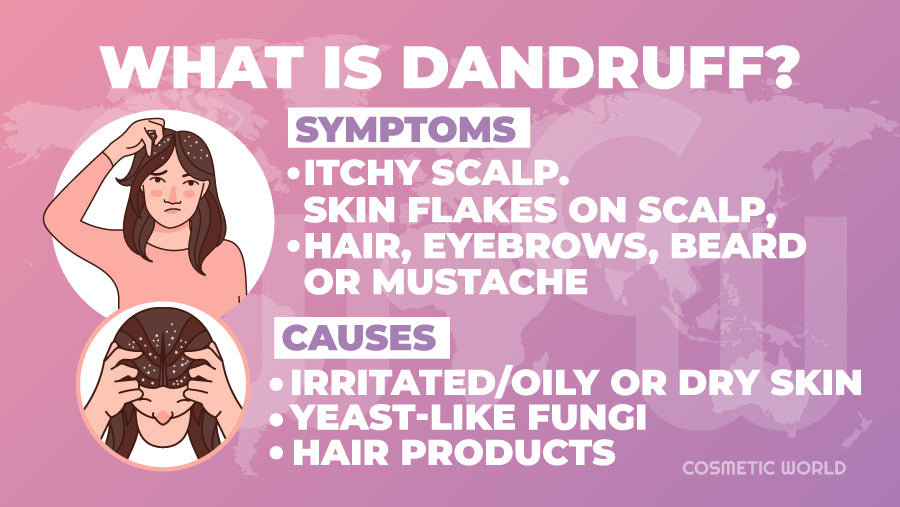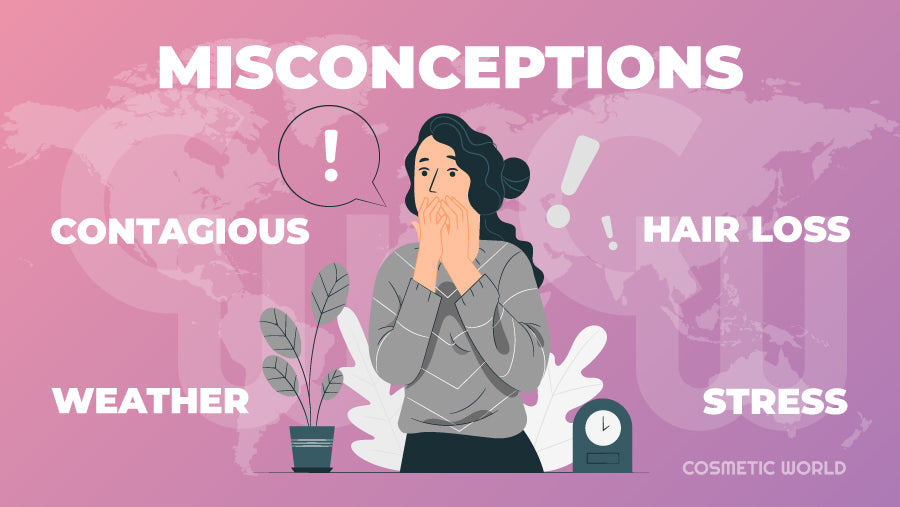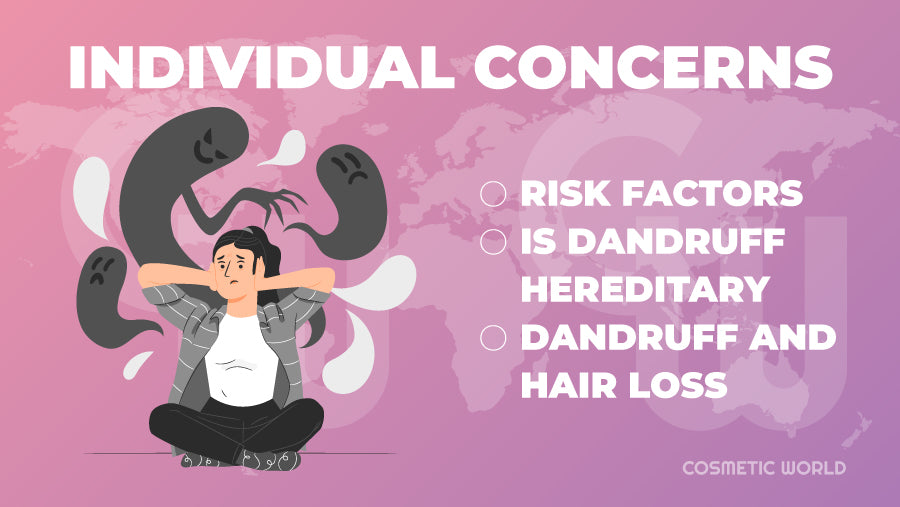We are back again to dispel some lingering clouds of confusion surrounding a topic we've all wondered about – Is dandruff contagious? This question is part of a bigger conversation about the notorious beauty buster, dandruff. It's a concern that affects about half of us at some point in our lives, and yet, so many misconceptions persist! Dandruff isn't just a simple annoyance, it's a persistent condition that needs to be understood and managed effectively.
Table of Contents
In this article, we'll delve deep into the dandruff dilemma. Is dandruff contagious or is it just another popular myth? What are the real causes of dandruff? Can it lead to hair loss? We'll answer all these questions and more, in addition to busting some common myths about dandruff. We will also discuss the various risk factors, the symptoms to look out for, and how to effectively manage and treat this condition. Finally, we'll touch upon when it's time to consult a professional. So, strap in, and prepare to become a dandruff expert by the end of this read!
Understanding Dandruff
Definition and Overview
Ever wondered why sometimes your black shirt looks like it's been in a minor snowstorm? That, my friends, is the skin condition called seborrheic dermatitis, more commonly known as dandruff. This pesky condition affects about half the population at some point in their lives, and while it can be managed, it can't be completely cured.
Symptoms of Dandruff
The most obvious signs of dandruff include an itchy scalp and those unsightly white flakes that have a nasty habit of appearing on your shoulders. In severe cases, you may also experience redness or a greasy scalp. It's also a common thing with infants to see crusty scalp (cradle cap).
Causes of Dandruff
The exact cause of dandruff is not fully understood, but it's generally agreed that it's not due to poor hygiene. It could be due to an overreaction of the immune system to a yeast-like fungus (no, not the mushroom kind) called Malassezia. Other factors like oil build-up, stress, or sensitivity to certain hair products can also contribute to a flaky scalp.
Moreover, the buildup can clog your pores, causing itching, redness, and irritation on your scalp. A buildup of irritants can cause contact dermatitis on the scalp and result in dandruff.
Is dandruff a fungus?
While a fungus can be one of the causes, dandruff itself isn't a fungus. It's a common condition of the scalp that leads to the skin peeling off in flakes.
Oh… and by the way, if you are wondering if you have dandruff, take a look and match it:
Common Misconceptions about Dandruff
Is dandruff contagious?
Contrary to popular belief, you cannot catch dandruff from someone else. It's as simple as that, catching dandruff from someone else is IMPOSSIBLE! So, the next time someone steps back from sharing your hairbrush, just smile and tell them, “Relax! Dandruff isn't contagious!”
Does stress cause dandruff?
Stress doesn't directly cause dandruff, but it can certainly make an existing condition worse. It's just another reason to prioritize self-care and relaxation. So, pick up that face mask, run a bubble bath, and put on your favorite tunes!
Does hot weather worsen dandruff?
While hot weather can increase oil production and exacerbate dandruff, it's not the direct cause. But it's still a good excuse to rock that sun hat!
Does dandruff cause hair loss?
In extreme cases, the inflammation and itching caused by severe dandruff can lead to hair damage. However, dandruff alone is not directly responsible for hair loss.
Individual Concerns and Dandruff
Risk factors
Certain factors can increase your risk of developing dandruff, including having dry skin, oily skin or hair, a poor diet, stress, and weather changes. All the more reason to eat well, manage your stress, and switch up your haircare routine with the seasons!
Is dandruff hereditary?
Dandruff does appear to run in families, which suggests a genetic link. However, it's not a certainty, and other factors like the environment and lifestyle also play a crucial role.
Dandruff and hair loss: what's the connection?
Persistent scratching due to an itchy scalp can damage hair follicles, potentially leading to hair loss. The key to preventing this is treating the dandruff.
Treatment and Management of Dandruff

First-line treatments: Medicated shampoos containing active ingredients like pyrithione zinc, salicylic acid, coal tar, or selenium sulfide are the go-to solutions for managing dandruff. Remember, folks, consistency is key! Regular use can keep those flakes at bay.
Natural treatments: Natural remedies with essential oil such as tea tree oil can also help control dandruff. Always remember to do a patch test first – no one wants a reaction ruining their day!
Lifestyle adjustments: Adopting a healthier lifestyle can work wonders in preventing dandruff. This includes managing stress (easier said than done, I know), maintaining proper hair hygiene, eating a balanced diet, and staying hydrated.
How to prevent dandruff for good: Washing your hair regularly to remove excess oil, avoiding irritants like synthetic fragrances, and regularly using a dandruff shampoo can help prevent dandruff from returning.
Author's note: Try to avoid the use of products like hair spray, mousse, and gel.
When to Seek Professional Help
When and why you should contact a doctor: If you've tried everything under the sun, and your dandruff persists or worsens, it's time to seek help from a dermatologist (skin conditions specialist). They can diagnose the cause and provide a more targeted treatment plan.
FAQ
Does dandruff go away by washing?
Short answer: 👎 No
Washing can help manage dandruff by reducing the buildup of oils and skin cells on your scalp. However, just regular washing may not completely get rid of dandruff. Using a medicated dandruff shampoo specifically designed to combat the underlying causes of dandruff will likely yield better results.
What kills dandruff fast?
Short answer: 💪🛀🧴 Medicated shampoos that contain active ingredients
Dandruff can be controlled quickly by using over-the-counter medicated shampoos that contain active ingredients such as zinc pyrithione, salicylic acid, selenium sulfide, or ketoconazole. Additionally, tea tree oil and apple cider vinegar have also shown promise as natural treatments. However, the speed at which these remedies work can vary from person to person.
Does dandruff naturally go away?
Short answer:👎No
Dandruff is a chronic condition that tends to come and go, but it does not usually go away completely on its own. However, with consistent use of appropriate shampoos and treatments, its symptoms can be effectively managed.
How often should you wash your hair with dandruff?
Short answer: 📆🚿🔄 2-3 times per week
If you have dandruff, it's generally recommended to wash your hair every day with a medicated dandruff shampoo until the symptoms are under control. After that, you can cut back to 2-3 times per week. However, this can vary depending on the severity of your dandruff and how your scalp responds to treatment, so it's best to consult with a healthcare provider.
Can dandruff appear if you have never had it before?
Short answer: 👍 Yes
Every scalp has factors that can cause dandruff. These include natural oils, known as sebum, and a microbe called Malassezia globosa. However, some people are more prone to developing dandruff than others. So yes, anyone can develop dandruff at any time.
Conclusion
So there you have it, my fabulous friends! Dandruff might be common, and a bit of a party pooper, but Is dandruff contagious – Certainly NOT! And with the right care and treatment, you can keep your scalp flake-free. Until next time, keep shining, keep smiling, and remember, your best accessory is confidence. This is Monika Petite, signing off!














